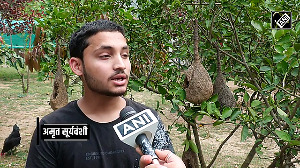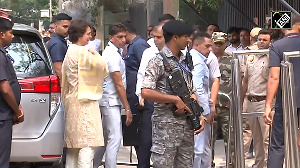Uttar Pradesh Governor Anandiben Patel has claimed that Vedic-era sage Bharadwaj, not the Wright Brothers, conceptualised the idea of an aircraft.

Addressing a convocation function at a university, Patel said students should study ancient Indian texts to appreciate the unparalleled research and discoveries made by their ancestors.
The sages and scholars of ancient India made remarkable discoveries and innovations that are benefiting the world even today, she was quoted as saying in a statement issued by Raj Bhawan.
Citing the example of Bharadwaj, the governor said, "He had conceptualised the idea of an aircraft, but the credit for its invention was given to another nation, and it is now recognised as the invention of the Wright Brothers."
She made the speech at the 9th convocation of Khwaja Moinuddin Chishti Language University in Lucknow on Monday.
Bharadwaj, a prominent 'rishi' from the Vedic age, is mentioned in both the Hindu epics Ramayana and Mahabharata.
Orville and Wilbur Wright, together known as the Wright Brothers, are credited with flying the first self-propelled aircraft on December 17, 1903, in North Carolina, USA. However, some BJP leaders have argued that the concept of a flying machine is demonstrated in the Pushpak Vimana' described in the Ramayana.
Interestingly, a research paper presented at the 102nd Indian Science Congress in 2015 claimed that Shivkar Bapuji Talpade had flown a flying machine over Chowpatty in 1895, eight years before the Wright Brothers.
The paper also claimed that aeroplanes existed in India 7,000 years ago and were capable of travelling between countries and even planets.
The paper, presented by a retired principal of a pilot training institute, attracted sharp criticism from some scientists who argued that it undermined the primacy of empirical evidence, which is the foundation of the 102-year-old Congress.
At the convocation, Patel urged universities to encourage students to delve into ancient Indian texts to appreciate the unparalleled research and discoveries made by their ancestors, and described these texts as "true treasure troves of wisdom."
Referring to the Rampur Raza Library, she highlighted its priceless collection of ancient books and artwork, some of which remain vibrant to this day, the statement said.
The colours used in these illustrations, derived from natural vegetation, have not deteriorated over time, Patel said.
The governor also instructed universities to facilitate the study of these ancient texts and translate them into various languages to ensure this knowledge reaches a wider audience, the statement added.
She remarked that India, the land of Buddha, has always chosen the path of peace over conflict, and under the leadership of Prime Minister Narendra Modi, the country is achieving new milestones in education and research.
Patel further stated that with a population of 1.4 billion, India is being "skilfully" guided by the Prime Minister, whose policies have elevated the nation's stature on the global stage.
The governor highlighted the substantial funds allocated for education in the current budget and urged universities to undertake projects in this direction and ensure that their benefits reach the students.
She also noted that the universities of Uttar Pradesh are performing well in national and international rankings. The universities' placements in the NAAC and NIRF rankings show that "even better results can be achieved with hard work," she added.











 © 2025
© 2025